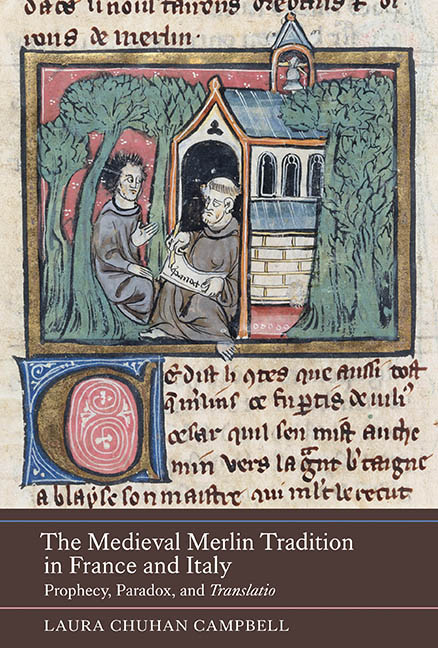Book contents
- Frontmatter
- Contents
- Miscellaneous Frontmatter
- Acknowledgements
- List of Abbreviations
- Introduction
- 1 Sympathy for a Devil? Merlin's Conception according to Robert de Boron and Paulino Pieri
- 2 Death of the Author: Merlin's Imprisonment by the Dame du Lac
- 3 Beyond the Limits of Interpretation: Rewriting Prophetic Discourse in the Estoire de Merlin and the Suite du Merlin
- 4 ‘Ce dit Merlin’: Open and Closed Prophecies in the Italian Merlin Tradition
- Conclusion
- Appendix 1 Chronology of Primary Texts
- Appendix 2 Summaries of the Principal Texts Discussed
- Bibliography
- Index
- Miscellaneous Endmatter
1 - Sympathy for a Devil? Merlin's Conception according to Robert de Boron and Paulino Pieri
Published online by Cambridge University Press: 23 August 2019
- Frontmatter
- Contents
- Miscellaneous Frontmatter
- Acknowledgements
- List of Abbreviations
- Introduction
- 1 Sympathy for a Devil? Merlin's Conception according to Robert de Boron and Paulino Pieri
- 2 Death of the Author: Merlin's Imprisonment by the Dame du Lac
- 3 Beyond the Limits of Interpretation: Rewriting Prophetic Discourse in the Estoire de Merlin and the Suite du Merlin
- 4 ‘Ce dit Merlin’: Open and Closed Prophecies in the Italian Merlin Tradition
- Conclusion
- Appendix 1 Chronology of Primary Texts
- Appendix 2 Summaries of the Principal Texts Discussed
- Bibliography
- Index
- Miscellaneous Endmatter
Summary
If there is one thing upon which most medieval authors of Merlin stories appear to agree, it is that Merlin is the son of a devil. The suggestion itself originates with Geoffrey of Monmouth's Historia regum Britanniae, where Vortigern, king of the Britons, interrogates Merlin's mother as to why her son apparently has no father. She responds that she became pregnant by a mysterious man whose identity she did not know, but who would suddenly appear to her in her room and vanish into thin air. A wise man is consulted as to the credibility of the tale; he identifies the young man as a possible incubus, a variety of devil which has the power to impregnate women:
Luna subest soli distantque loco; locus ille
Demonibus datus est, qui sumpta sepe virili
Forma decipiunt fatuas gravidantque puellas
Huius forte fuit pueri pater incubo talis.
[The moon is below the sun, and they are separated by a space; this space is allotted to demons, who often assume the shape of men and so deceive and impregnate foolish girls. Perhaps an incubus of that sort was this boy's father.]
As Stephen Knight observes, Geoffrey leaves the identity of Merlin's father deliberately ambiguous. Vortigern's supposedly wise advisor has already demonstrated his incompetence by suggesting that the king's tower can only be successfully built if Merlin's blood is mixed with the foundations; Merlin himself is quick to prove him wrong, throwing into question the advisor's authority.
The motif of Merlin's conception by a devil captured the imagination of later vernacular authors, and became a stable feature of the Merlin story in subsequent translations and rewritings. It forms a fundamental aspect of Merlin's identity, presenting the devil as the source of his shape-shifting, knowledge of all things past and present, and magic, and at the same time forms a counterweight to his God-given prophetic powers. In saving Merlin's soul, however, God does not erase the abilities that are inherited from his demon father: ‘ne vaut pas Dix que li diables perdist chose qu'il doie avoir, ains veut bien que il ait ce que il doit avoir’ [did not want the devil to lose that which properly belongs to him; in fact, he wanted him to have it] (pp. 593–94).
- Type
- Chapter
- Information
- The Medieval Merlin Tradition in France and ItalyProphecy, Paradox, and Translatio, pp. 27 - 64Publisher: Boydell & BrewerPrint publication year: 2017

